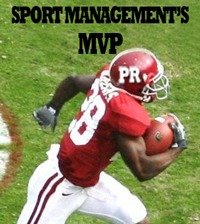Sport Management's MVP
Posted At: November 23, 2009 12:02 PM
by Niki Gautier
 When sports teams or players have a crisis, who gets them out of that crisis? When there is a sporting event that needs to be planned, who is there to get everything together? Behind the scenes of every press conference, who is coaching the coach on what to say?
When sports teams or players have a crisis, who gets them out of that crisis? When there is a sporting event that needs to be planned, who is there to get everything together? Behind the scenes of every press conference, who is coaching the coach on what to say?
A degree in public relations covers education in a variety of occupations. Students learn basics as an undergrad in various areas like marketing and journalism. However, how often do students consider sport management as the next step in PR?
Josh Maxson, assistant coordinator of media relations for the football team at TheUniversity of Alabama, coordinates all the player interviews, compiles notes packages, writes media guides and oversees awards campaigns. He is the go-between with the players and the media.
“The media sends me their requests and I work to fill those requests around our players’ schedules,” said Maxson. “I also try to give our players an idea of what kind of questions they are going to have to answer and work with them on ways to answer the difficult ones.”
Obviously, his main duty is “dealing” with the media.
“They have a job to do, I have a job to do, and they don’t always work in harmony,” said Maxson. “… [Media] headlines can be distracting to our players, who are here to get an education and win football games. So I work to find a happy medium.”
Maxson said, “PR students with a little bit of a journalism background are the perfect mix for media relations,” because of all the writing that he has to do. However, he said, “… Even more important than that, I have to build relationships with both my athletes and coaches and the media. I have to be able to work both sides of the fence, and I have to know what both sides need from me, and that is where the public relations comes in.”
According to Maxson, there are two things that a public relations practitioner in sport management should possess: good verbal and written communication skills. “You need to be able to relate to people and in different ways,” he said. “I have to deal with two kinds of people every day – the media and my players and coaches. … If you don’t have those [communication skills], success in this business is limited.”
Maxson gave his advice for students who want to pursue a degree in sport management and/or want a future in the area: “… Be willing to work. It is long hours for average pay, but it has its perks. Develop your written and verbal communication skills and go find job experience. You need to have an idea of how to step in and do the job of your first day out of college. A master’s degree is a great thing to have, but the job experience is what will distinguish you from other job candidates.”
“You can’t learn in the classroom what you can learn doing the job every day and learning from those experiences,” says Maxson. “I learned more about the business working 30-plus hours a week at Oklahoma State as a student in the media relations office than I ever learned in class.”
Many universities across the U.S. provide undergraduate and graduate degrees for sport management.
Laurence Chalip is the author of Sport Governance in the Global Community and is currently a professor at the University of Texas at Austin who teaches public relations to undergrads and sport management to graduate students. He believes that “a degree in communications or business can be good training for working in sport, but we have gotten to the stage that it helps to have more specific skills.”
Chalip said, “There are lots of sport-specific things to know about, such as fan development strategies, event operations, etc.,…[and] sponsorship is key in sport (and other industries), but is rarely if ever covered in business or communications training.”
Although he believes that it may be better to have a more sport-specific degree going into sport management, he said, “The quality of your training (regardless of the name of the discipline) is more important than what the discipline is called. … It’s up to the student to make sure they are getting the best [training] possible.”
Chalip believes good qualities a sport manager should have are “expertise and knowledge relevant to managing in the sector of the sport industry in which they are working. … Good managers are reflective people who have the knowledge and training on which to ground their reflections on their working lives.”
According to Chalip, there is no “typical” future for sport management graduates. “We have graduates in every facet of sport, and some who have gone into other or related industries (such as entertainment, corporate services, government, etc.),” said Chalip. “People make their own careers, and use their training to do so.”
There is significant work behind the scenes of sports, and management is definitely a huge part of any team or player. Management is the backbone of any sports team, and public relations is a major player on that team.
Photo ed. by Niki Gautier


